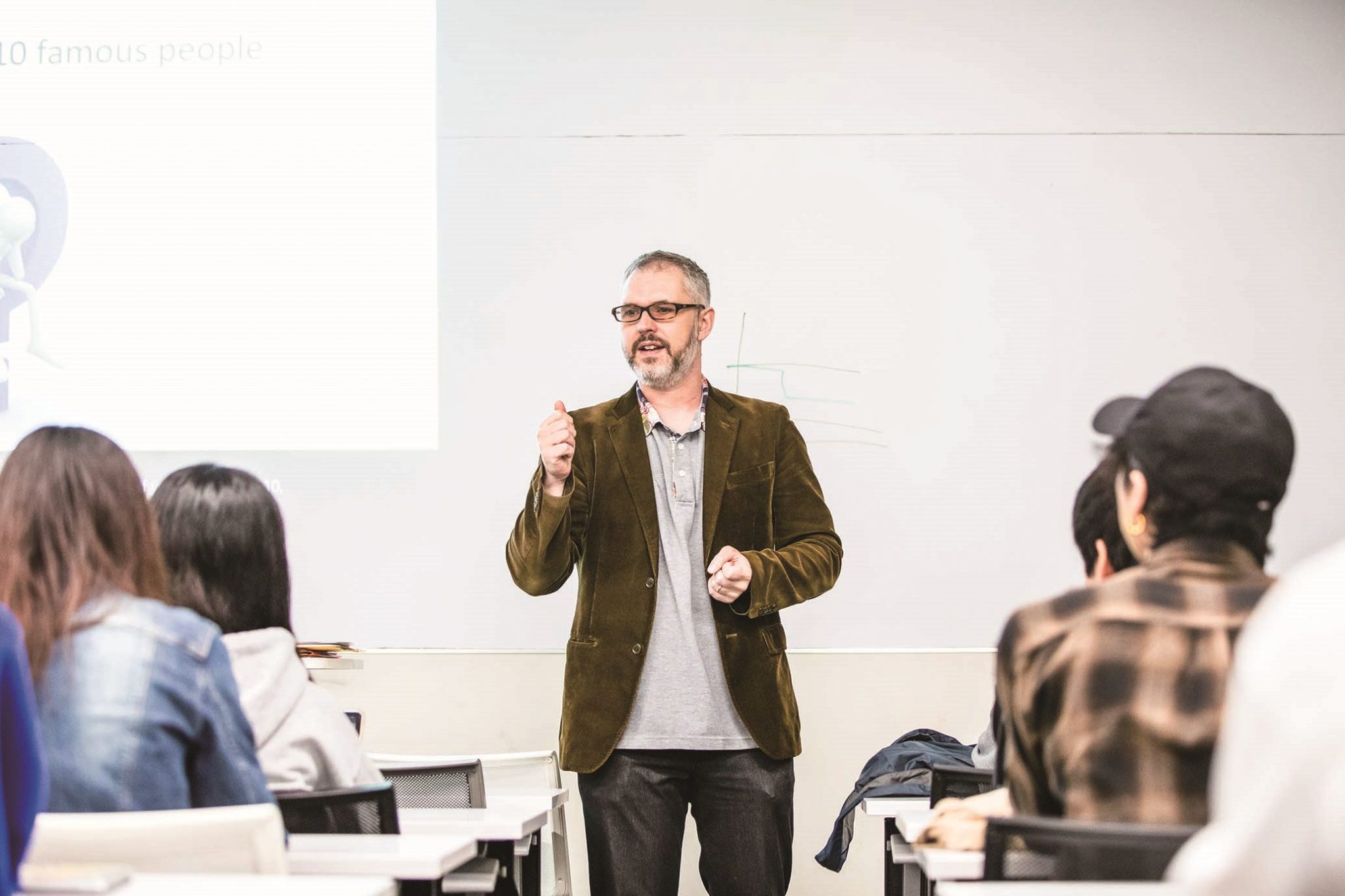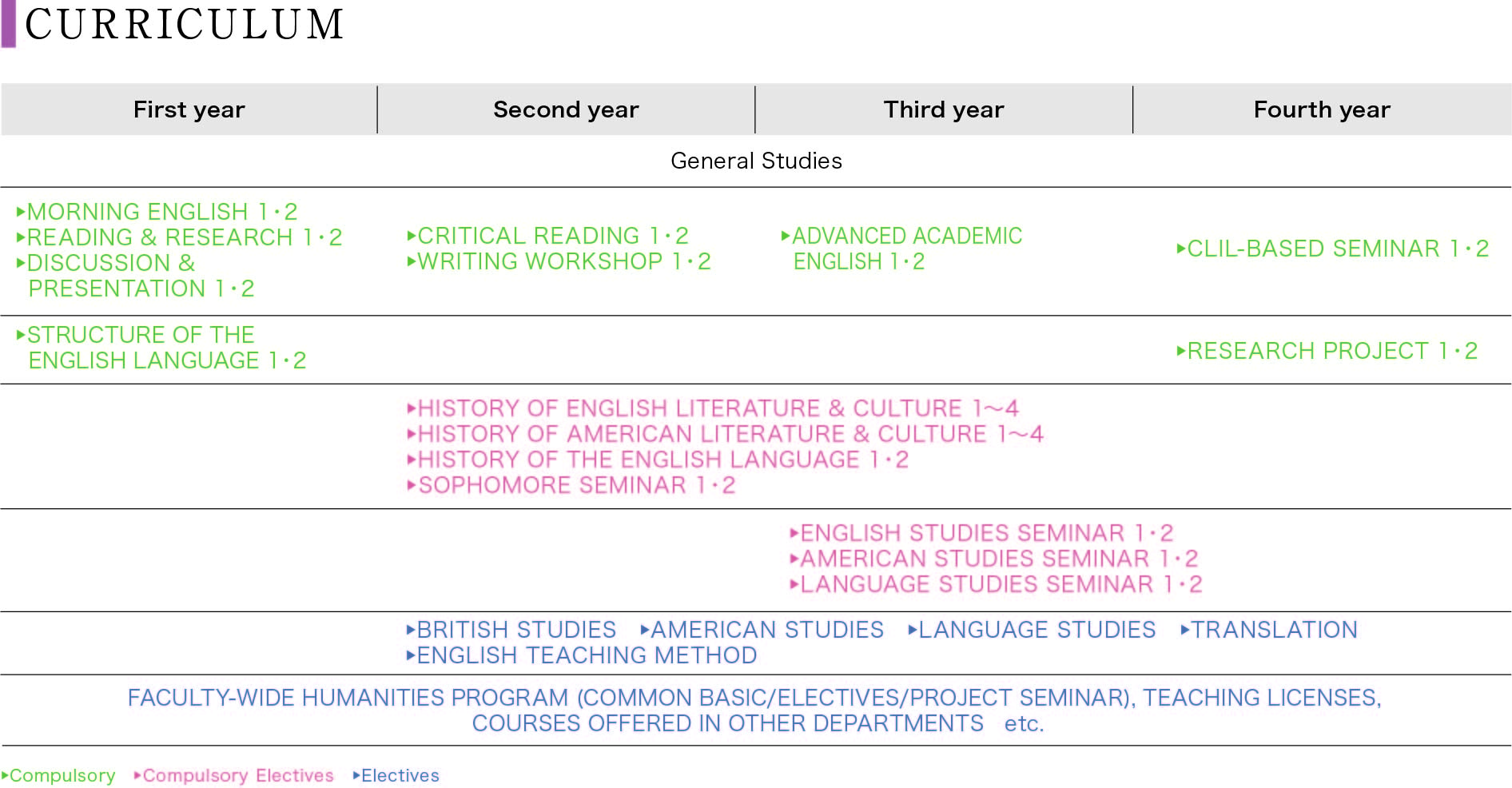Department of English Literature


Department Features
Not only by evaluating literary works written in English as verbal art but also by studying the cultural and historical contexts that created them, students gain insight into the universality and pluralism of humanity and its society. With an intensive thinking exercise in small classes and the writing of a graduation thesis as the culmination of undergraduate study, students will develop the ability to identify problems with a critical view, methods for seeking solutions based on research and analysis, and the skills to logically communicate the results in both Japanese and English.
In this way, our goal is not only to hone English language skills as a means of communicating information but also to become a global citizen in the truest sense, a “language professional” who utilizes competent intellect to deal with the various issues that arise in intercultural negotiations.
Curriculum
In the first year, students thoroughly fortify their basic English language skills (Foundation Skills). In order to prevent the reduction in English study time in the following years, English skill classes are mandatory throughout the whole curriculum, allowing students to continue improving their English language skills while preparing them for specialized courses of their respective majors. Such developmental learning is to be completed in the fourth year of CLIL (Content and Language Integrated Learning), where English language skills and expertise are integrated.
Along with mandatory courses, from the third year, students choose their majors from the three specialized courses ((1) British Studies, (2) American Studies, and (3) Language Studies) to explore their own themes. In the “Research Project” in the fourth year, students bring the knowledge and skills they have learned over the four years in the form of a graduation thesis under the individual guidance of a faculty member called Tutorial.
as of 2022
* Please refer to the syllabus for more information on the courses.
Course Examples
- Morning English
With tests based on British vocabulary study books, listening tests on authentic materials, and grammar review, students will improve their basic English skills in both everyday and academic English from a variety of perspectives.
- Research Project
Through the Tutorials with faculty members, students will compose a graduation thesis based on their knowledge of and consideration of British and American literary works, culture, and language, referring to the previous research and contents they studied over the past four years.
- Translation Theory
The program offers a series of rotational lectures by translators and editors active in various fields to cultivate practical skills in English-Japanese translation. Students will also engage in actual translation work on a wide range of literary and visual works.
- Writing Workshop
Students will learn how to write professional-level English papers, including paragraph organization, punctuation, logical development, and argumentation. Classes are taught mainly by native speakers, and students’ natural ability to express themselves is also developed at the same time.
- CLIL-based Seminar
Students study specialized subjects in English using CLIL (Content and Language Integrated Learning), a new foreign language learning method. Students will acquire the specialized skills, language skills, thinking skills, and multicultural collaboration skills required in a global society.
- Specialized Lecture Courses
History of English Literature & Culture/History of American Literature & Culture/History of the English Language
Core courses for the three specialized courses (1) British Studies, (2) American Studies, and (3) Language Studies. Build a foundational knowledge for each course with systematic approach to the study from a historical perspective.
- Seminar styled class
English Studies Seminar, American Language, Language Studies Seminar
This is a seminar-style class in which students are assigned to each of the three courses: (1) British Studies, (2) American Studies, and (3) Language Studies. Students are thoroughly trained in close reading and analysis of literature, leading to their graduation theses.
- Sophomore Seminar (new)
From the 2023 academic year, we have inaugurated the Sophomore Seminar, a course dedicated to improving the Japanese communicative ability, with the aim of strengthening the English and Japanese language training that supports the acquisition of specialized knowledge. Through the language learning experience in both English and Japanese, the program encourages intellectual activities such as acquiring specialized knowledge, critical thinking, and presenting new hypotheses.
Available Teaching Licenses and Subjects
- First Category Teaching license for Junior High School (English)
- First Category Teaching license for High School (English)
Curatorial courses are available.
Educational Objectives and Policies
-
To broaden one’s knowledge of Anglo-American literature, thought, and culture, to identify issues from a systematic and critical perspective, and to acquire the ability to logically communicate the results of one’s research and analysis in both English and Japanese.
-
To be able to tackle the newly discovered issues that arise in the international community by using insightful analytical skills and advanced communication skills based on a deep understanding of language, culture, thought, history, and society.
-
With the aim of cultivating individuals who acquire the literacy to decipher the multiplicity and ambiguity of meanings that inevitably accompany human activities, our department has established the following abilities and knowledge that students should have acquired at the time of graduation. Upon completion of graduation requirements, students are recognized as having mastered these requirements and are awarded a degree.
- Able to understand the differences in the way reality is expressed in Japanese and English, with sensitivity to the diversity of linguistic expressions in both directions of transmission and reception
- Sufficient Reading, thinking, imaginative and expressive skills essential to address the need to reconstruct and reinterpret concepts such as cultural diversity and cross-cultural understanding in one’s own words, rather than as general knowledge that entails surface discourse.
- Able to take on real-life challenges in various aspects of society without losing sight of one’s own position through the systematic accumulation of intellectual training.
- The ability to acknowledge the importance of the intellectual activity of learning, which exists beyond the useful aspects of language.
- A high level of linguistic proficiency in both Japanese and English and a systematic expertise in the language, literature, history, and culture of the English-speaking world, as well as the ability to apply this knowledge in practical scenes.
-
In line with the Diploma Policy, our department organizes its curriculum with courses that incorporate the following objectives in order to achieve a synergistic effect in acquiring literacy by focusing on both the social and cultural aspects of language.
- During undergraduate years, students select one of the three majors and learn the specialized knowledge required for each area with tightly organized courses optimized for each course, enabling them to acquire, understand, and apply knowledge in a systematic manner.
- Through structural education that connects general acquisition of knowledge, individual readings, discussions, presentations, and active communication with faculty members, students will acquire versatile language expression skills in both theory and practice.
- Students will acquire advanced English literacy through four years of learning backed by vigorous attitude of self-study, and at the same time, the learning process will provide an opportunity to reevaluate their knowledge and operational skills in their first language.
- Close analytical readings of the experience and language both of which that are not your own, students will acquire consciousness of the multiplicity of semantic effects of language.
- To utilize the knowledge of the language, culture, and history of English-speaking countries acquired in a systematic manner, courses for training English teachers, translators, and other professionals will be arranged.
- Students are required to write an insightful graduation thesis with originality in Japanese or English as the culmination of their acquired knowledge, language and thinking skills in their field of specialization.
-
We accepts students who are interested in language in general, in the social semantic effects of specific languages, and in the reading and analysis of texts as linguistic expressions.
- Able to consider the purpose of studying English with consideration to negative factors of using English as an international language, that resides beyond seeing English as a mere communicative method.
- Understands that language forms the basis of human activity and have a sufficient level of interest in literature, which is an important part of human linguistic activity.
- Has a sufficient level of English language skills to read and understand various text, while addressing the language as the medium for understanding others and oneself, and texts as a production of such linguistic activity.
Faculty Members
Tomoyuki IINO Professor
Juro OTSUKA Professor
Dominic CHEETHAM Professor
Tomomi NAGATOMI Professor
Hogara MATSUMOTO Professor
Kazuhiko YAMAGUCHI Professor
Shun OGAWA Assistant Professor
Akihiro MACHIMOTO Assistant Professor
Lay Sion NG Assistant Professor
